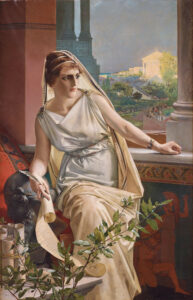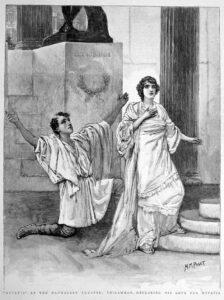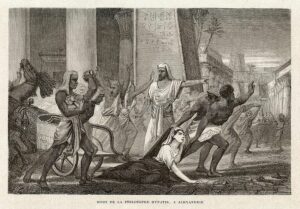The traditional role for women in the ancient world sounds familiar to the role that would be imposed for centuries to come: attendance to the domestic needs of the family, maintenance of the home, care of the sick and preparation of the food. Nevertheless, one Alexandrian mathematician named Theon decided to go against his Greek tradition, teaching his daughter Hypatia his own trade. Born in 370 AD, Hypatia would go on to become a respected academic at the University of Alexandria, Egypt, in 400 AD, lecturing large crowds eager to hear her teachings. Her life is a reminder that women have always had the capacity for greatness, but have time and time again been restricted by an overbearing society which has prevented them from pursuing their goals. Moreover, whilst it would be preferable that Hypatia could simply be remembered for her academic achievements, her death serves as a grim reminder of the oppression that runs in the blood of women’s history, setting her in stone as a feminist figure.
Hypatia specialised in mathematics and astronomy, some of the most respected disciplines in the ancient world. She became the world’s leading academic in these areas in her time; the only woman in history for whom such a claim can be made. Continuing her father’s work in these fields, she is credited with commentaries on Apollonius of Perga’s Conics, Diophantus of Alexandria’s Arithmetic and an astronomical table which was possibly a revised version of her father’s commentary on the Almagest. Disappointingly, no copies of her works survive, but through the commentaries that we know she wrote, we can say that she was pushing the field of study into more modern and difficult areas.

Alongside her mathematical and astronomical background, Hypatia was also a popular teacher and lecturer on philosophical topics of a non-specialist nature, often attracting a large audience of avid listeners. She was a Neoplatonic philosopher, an approach that taught that there is an ultimate reality beyond the reach of human thought or language.
Hypatia was not just an extraordinary woman for modern readers, but contemporaries were also surprised that such a learned and knowledgeable woman, who defied the regular social order of the time, could exist in Alexandria during that period. One ancient historian named Damascius described her public lectures:
Donning the tribon [the robe of a scholar, and therefore a masculine item of apparel], the lady made appearances around the center of the city, expounding in public to those willing to listen on Plato or Aristotle or some other philosopher […] There was a great crush around the doors [of her house], a confusion of men and horses, of people coming and going and others standing about, for Hypatia the philosopher was now going to address them.

The city of Alexandria itself was the perfect home for academics like Hypatia. Under Roman jurisdiction since 80BC, the city was mostly made up of a mix of Egyptians and Greeks, and this blend of culture reflected in its status in the ancient world. For centuries, it had been the centre of academia in the ancient world, with the great Library of Alexandria being said to be home to half a million books, which professors of the city’s university, including Hypatia, would have had full access to. Even in its relative decline during Hypatia’s time, Alexandria rivalled even Athens as the Mediterranean’s jewel of knowledge and culture.
However, the spread of Christianity, a relatively new but growing religion, threatened the balance of this city. When the Roman emperor Constantine the Great (272-337 AD) made Christianity the new state religion, the Christians of Alexandria, a previously persecuted sect of people, then felt empowered to strike back against their pagan rivals, including Hypatia, who they viewed as a pagan given her Neoplatonist teachings. This often culminated in violence and riots, with the Jewish population of Alexandria being the main victims in 415 AD. Many were killed by Christian mobs and the survivors were expelled from the city, while their possessions were seized and synagogues were converted to churches. In a frenzy over their ‘victories’, however, the mob went searching for other enemies, including Hypatia.
On her way home from her daily lectures at the university, a group of religious zealots attacked Hypatia, dragging her from her chariot into a church, where they stripped her naked, flayed parts of her body with oyster shells and brutally beat her to death before burning her body. The archbishop of Alexandria, Cyril, who had encouraged the attack on the Jewish community and by extension indirectly caused Hypatia’s murder, went on to be declared a saint for his efforts in fighting paganism and defending the faith. The University of Alexandria was sacked on his orders, temples were torn down and intellectuals booted from the city.

After the feature film Agora in 2009, which depicted the life and death of Hypatia, a spark of controversy emerged from some Christians who objected to Alexandrian Christians being depicted as fanatics who were hostile to learning and culture. But, as philosopher Joshua Mark argues, ‘It is by no means an exaggeration to claim that Alexandria was destroyed as a centre of culture and learning by religious intolerance’, with Hypatia’s death coming to symbolise this tragedy.
Cited as the end of the classical era, Hypatia’s death is a stark reminder of the problems surrounding religious zealotism, including the destruction it can cause. Looking at her life of academia and study, too, Hypatia has also become a powerful feminist figure in the fight for female intellectualism in the face of ignorance and prejudice. Her academic accomplishments would have probably been sufficient to make her name known in history, but, in a rather tragic twist, her death has guaranteed it. She was determined to exercise her right to education, something that is still denied to a shocking number of girls and women around the world today.



